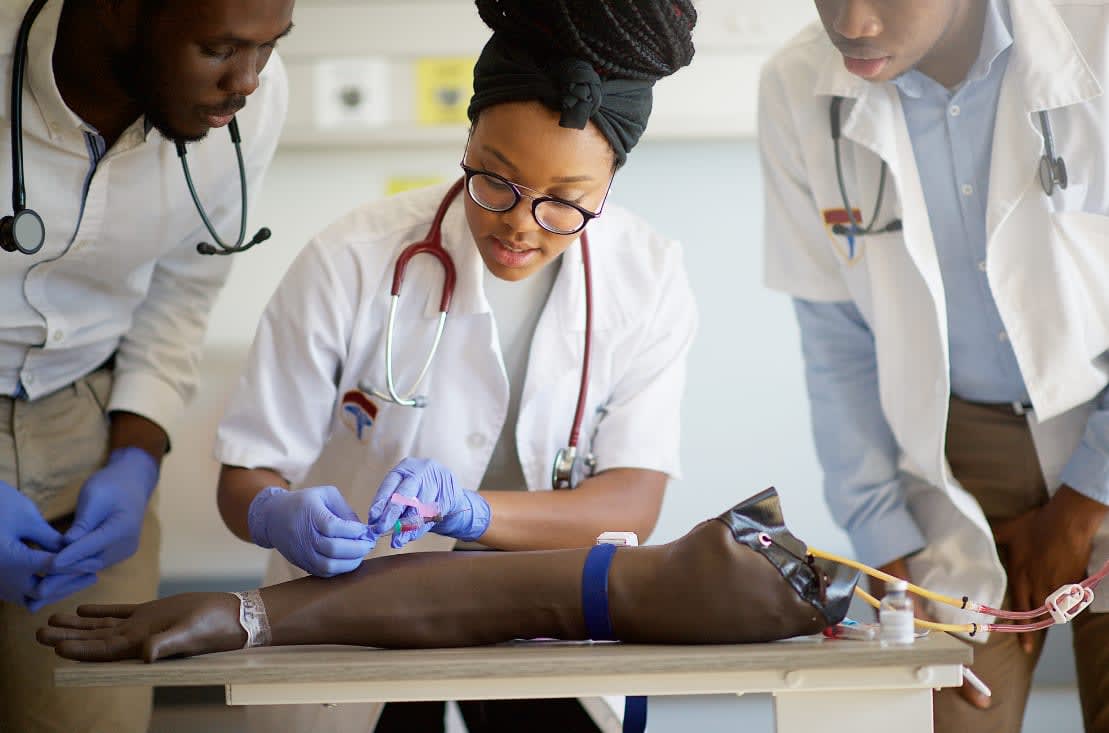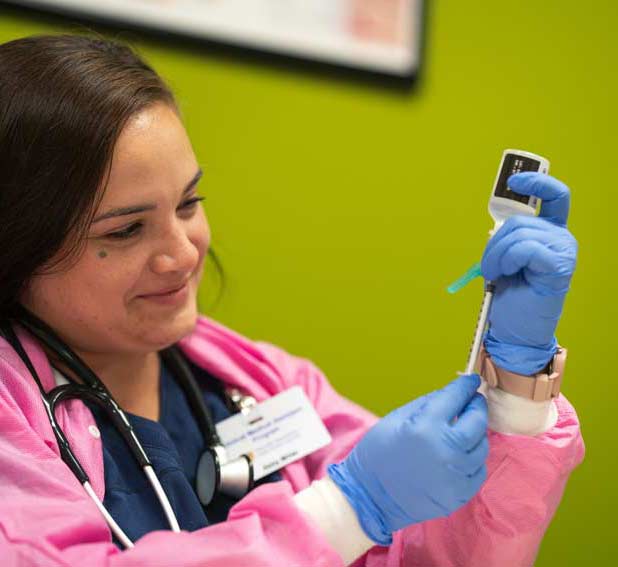Preparing For the Certification Exam After Your Phlebotomy Training Course
Preparing For the Certification Exam After Your Phlebotomy Training Course
Blog Article
The Course to Qualification: Understanding the Phlebotomy Educating Training Course Trip and Its Relevance
As you take into consideration the course to certification in phlebotomy, it is very important to comprehend the role you'll play in medical care. Your training will certainly cover necessary skills, from blood collection strategies to patient interaction. Each component of the program prepares you for the obstacles in advance. What exactly does the journey require, and why is certification so vital for your future profession? Let's explore these concerns additionally.

The Role of Phlebotomists in Medical Care
Phlebotomists play a vital role in the healthcare system, functioning as the vital web link between individuals and necessary analysis screening. You'll do blood draws, making sure examples are accumulated accurately and safely. Your experience aids in detecting medical conditions, checking health and wellness, and guiding treatment decisions.
In your day-to-day interactions, you'll need to develop trust with patients, making them feel comfy throughout what could be a stressful experience. You're accountable for classifying and managing examples thoroughly to avoid contamination or mistakes, which might impact test outcomes.
Yet, you'll often work together with medical professionals and registered nurses, communicating important information concerning clients' problems. Your function is basic in maintaining the workflow in healthcare setups, making sure prompt and accurate results. By understanding your abilities, you add meaningfully to person treatment, making you an important component of the clinical group. Accepting this obligation is vital to your success as a phlebotomist.
Review of Phlebotomy Training Programs
When checking out phlebotomy training programs, you'll discover various kinds made to fit various timetables and finding out styles. Each program assists you develop necessary abilities like blood collection and individual communication. Comprehending these choices is key to picking the right course for your job.
Kinds Of Training Programs
Several types of training programs are offered for those looking to come to be skillful in phlebotomy. Additionally, some hospitals and centers use on-the-job training programs, supplying practical experience while you discover. Whatever path you choose, each program aims to equip you with the essential skills for an effective phlebotomy job.

Key Skills Developed
Grasping phlebotomy requires a set of crucial abilities that are created via extensive training programs. You'll find out technological skills like appropriate capillary selection, needle insertion, and blood collection techniques. These hands-on techniques guarantee you can execute procedures securely and successfully. In addition, communication abilities are fundamental; you'll require to interact with patients, clarify treatments, and placed them secure. Recognizing composition and physiology is essential, as well, as it aids you situate blood vessels and understand the body's response to blood attracts. You'll get understanding of safety and security methods and infection control, ensuring you keep a sterilized setting. Each of these abilities is vital for your success as a certified phlebotomist, making you a useful asset in any healthcare setting.
Secret Components of a Phlebotomy Program
In a phlebotomy course, you'll focus on vital subjects that lay the groundwork for your future occupation. You'll involve in hands-on training that enables you to apply what you've found out in real-world setups. Both the curriculum and practical experience are important for your success as a phlebotomist.
Curriculum Overview
While going after a phlebotomy training program, you'll come across a curriculum created to outfit you with fundamental skills and expertise. Phlebotomy Classes Near Me. This educational program generally includes composition and physiology, concentrating on the circulatory system and comprehending blood parts. You'll likewise find out about various types of blood collection approaches, consisting of venipuncture and capillary slit techniques
In addition, infection control and safety and security methods are crucial components, ensuring you recognize how to maintain a clean and sterile environment. You'll study patient interaction, highlighting interaction and compassion, which are essential for reducing person anxiousness.
Hands-On Training Experience
Obtaining hands-on experience is an indispensable part of your phlebotomy training course. This functional training permits you to apply what you've found out in a real-world setup, boosting your skills and self-confidence. You'll practice venipuncture techniques, find out how to take care of different kinds of samplings, and obtain knowledgeable about the devices used in the field. Under the guidance of seasoned instructors, you'll improve your abilities, guaranteeing you're planned for any type of circumstance you could encounter.
In addition, you'll get the opportunity to connect with individuals, which is important for developing your communication skills. This combination of technical proficiency and interpersonal skills is important for your success as a licensed phlebotomist. Inevitably, hands-on training is where concept satisfies practice, strengthening your expertise and preparedness for certification.
Qualification and Licensing Demands
Prior to you can start your profession in phlebotomy, it is vital to understand the accreditation and licensing requirements that differ by state. Most states require phlebotomists to hold an accreditation from you can try this out an identified organization, such as the National Phlebotomy Organization or the American Society for Medical Pathology. These accreditations commonly include passing an exam that checks your understanding and abilities in the field.
In addition to qualification, some states have specific licensing requirements. You might require to complete a particular number of hours in scientific practice, submit evidence of training, or go through a background check. It is essential to research your state's policies to see to it you fulfill all needed standards.
Staying notified concerning these needs not only assists you secure a placement however also boosts your trustworthiness as an expert. By fulfilling these requirements, you'll be well on your means to a successful profession in phlebotomy.
Hands-On Training and Practical Experience
Hands-on training and functional experience are vital components of your phlebotomy education, as they enable you to use theoretical understanding in real-world scenarios. Throughout your training, you'll take part in supervised venipuncture, discover proper techniques, and come to be acquainted with numerous blood collection equipment. This straight participation is essential for developing your confidence and honing your abilities.
You'll work carefully with experienced specialists that can see this page lead you with the nuances of client interaction and sample handling. Each technique session not just enhances your understanding but likewise prepares you for the fast-paced atmosphere of health care settings.
In addition, lots of programs integrate medical turnings, permitting you to experience varied setups, from medical facilities to outpatient clinics. This direct exposure aids you adapt to different obstacles and individual demands, ensuring you're well-prepared for your future role. Embrace these opportunities, as they're necessary to becoming a skilled and thoughtful phlebotomist.
Difficulties Encountered During Training
While getting hands-on experience is essential, it's crucial to identify the challenges that can emerge during your phlebotomy training. Additionally, mastering the skills needed for blood attracts takes practice; you might struggle with strategy originally.
Time administration can additionally be an obstacle, as balancing theory, sensible sessions, and personal dedications can really feel intimidating. You may deal with differing discovering speeds among your peers, causing sensations of insecurity if you believe you're dropping behind. Ultimately, adapting to the various characters of instructors can be tough, as each may have an unique teaching design.
Acknowledging these obstacles early on can prepare you for success and aid you establish durability throughout your training trip.
Career Opportunities After Qualification

As you acquire experience, you might also consider concentrating on areas like pediatric or geriatric phlebotomy, catering to particular patient demands. Some phlebotomists pick to advance their careers by becoming research laboratory technicians or pursuing further education in medical care fields.
In addition, your qualification can bring about duties in training or overseeing new phlebotomists, allowing you to share your expertise. With the medical care market constantly growing, your abilities will certainly always be in need, leading the way for a steady and fulfilling job. Accept the opportunities awaiting you!
Frequently Asked Questions
What Is the Typical Period of a Phlebotomy Educating Training Course?
Phlebotomy training courses commonly last around 4 to eight weeks. You'll take part in hands-on method, class direction, and on-line learning. Completing this training prepares you for qualification and a fulfilling career in medical care.
Are Online Phlebotomy Courses Available?
Yes, on the internet phlebotomy programs are offered. They use adaptability and ease, permitting you to examine at your own rate. Just confirm the program is accredited to satisfy accreditation demands and get beneficial skills for your career.
Just How Much Does Phlebotomy Training Commonly Cost?
Phlebotomy training typically sets you back between $700 and $2,500, depending upon Click This Link the program and location. You should take into consideration aspects like course size, included materials, and hands-on experience when selecting the right training for you.
What Prevail Prerequisites for Phlebotomy Training?
Common prerequisites for phlebotomy training frequently include a secondary school diploma or GED, immunizations, and a history check. Some programs might additionally need fundamental medical care expertise or qualifications, ensuring you're prepared for hands-on training.
Can I Work While Completing My Phlebotomy Training?
Yes, you can function while finishing your phlebotomy training. Several trainees equilibrium jobs with their research studies, but ensure to manage your time properly to guarantee you satisfy both job and training commitments efficiently.
Report this page